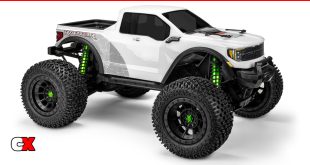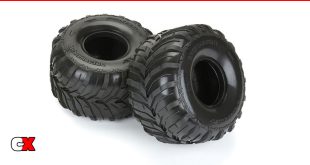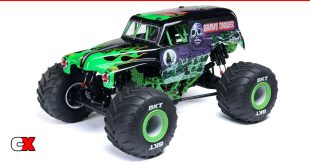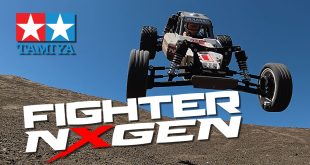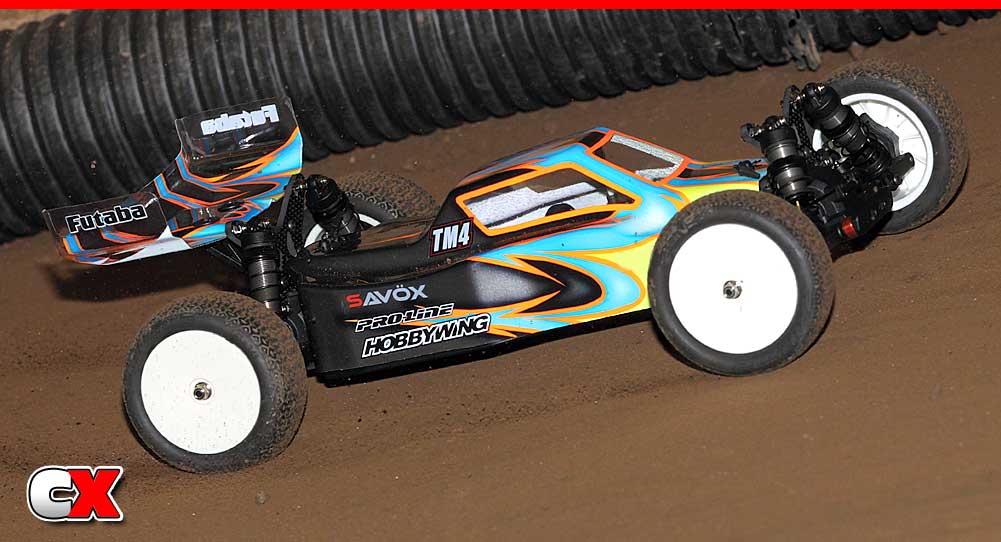
One of my favorite 1/10-scale classes is 4WD buggy. These little ground-level fighter jets can turn almost any track into a fun-filled playground, carving corners and flying high over triple jumps. They’re buff enough to handle brutal power yet still have the finesse to tip-toe through a rough washboard. Traction is never really a problem. If you get out of shape over a jump, twist the wheel and give it more throttle. You can pull yourself out of almost any situation. Oh, and did I mention I’m talking about my experience with the TM4? Ya, well, I did all that in my recent taste-test with Team C’s entry into the 4WD class. But wait, there’s more…
AT A GLANCE
WHO MAKES IT: Team C
WHO IT’S FOR: Experienced Racers
PART NUMBER: TM4
HOW MUCH: $429.99
BUILD TYPE: Kit
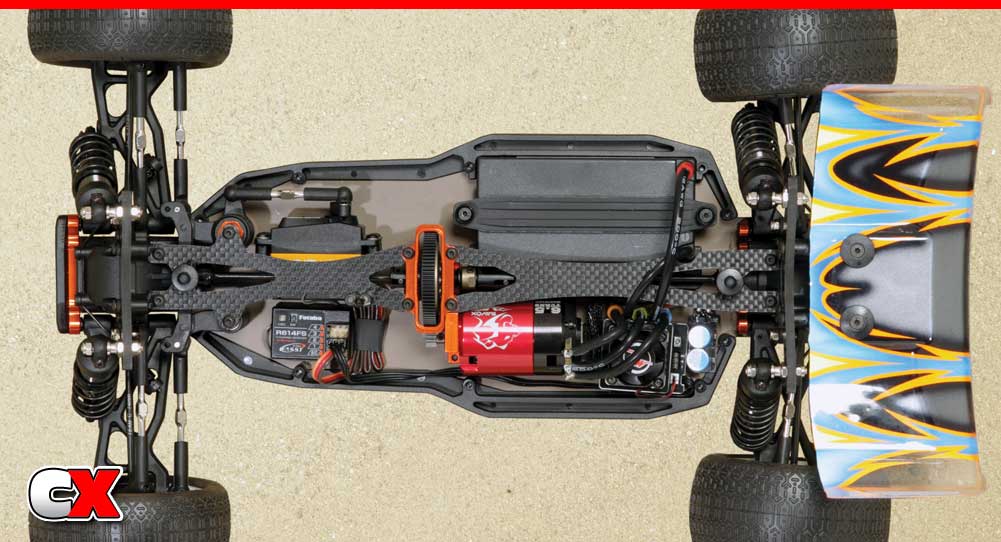
FEATURE BREAKDOWN
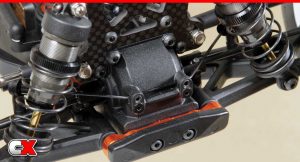 • The TM4 connects to a functional, 7075-T6 aluminum chassis. By functional I mean that it’s all business; there are no cutouts or recesses cut into it and there is plenty of room to mount electronics. A shorty LiPo is all that can be managed into the battery tray, but rest assured that your battery is NOT going to leave this car. I also like the sideways mounted servo. If you need to re-adjust your servo (say, because you didn’t do it beforehand), it’s very easily done. The receiver mounts right behind it with plenty of space for tidy-wires, a transponder or even a receiver pack if you feel you really need one. Plastic side rails run the length on both sides, helping to remove any chassis flex. They also provide a nice, tight seal when the body is mounted. Looking at the bottom, everything sits flush; no metal edges sticking out or odd overlaps that could catch on the ground when you’re going fast.
• The TM4 connects to a functional, 7075-T6 aluminum chassis. By functional I mean that it’s all business; there are no cutouts or recesses cut into it and there is plenty of room to mount electronics. A shorty LiPo is all that can be managed into the battery tray, but rest assured that your battery is NOT going to leave this car. I also like the sideways mounted servo. If you need to re-adjust your servo (say, because you didn’t do it beforehand), it’s very easily done. The receiver mounts right behind it with plenty of space for tidy-wires, a transponder or even a receiver pack if you feel you really need one. Plastic side rails run the length on both sides, helping to remove any chassis flex. They also provide a nice, tight seal when the body is mounted. Looking at the bottom, everything sits flush; no metal edges sticking out or odd overlaps that could catch on the ground when you’re going fast.
• The suspension is also basic, in that it isn’t overly-developed to ‘be cool’. Plastic arms, caster blocks and steering blocks connect with a very minimalistic feel and are retained by a full set of aluminum arm mounts. The arm mounts use inserts that allow you to tune kickup and roll centers (in the front) and anti-squat, roll centers and toe in the rear. Front and rear anti-roll bars are also included. The threaded, 12mm shocks are very smooth and connect to hulk-thick, 4mm shock towers. Everything just looks and works great, however my one complaint is the front droop screws. Once the TM4 is assembled, there’s no getting to these. Some minor disassembly is required to adjust. Thankfully I don’t mess with front droop too much once I find a setting I like.
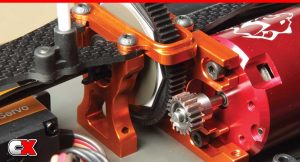 • The steering system consists of a dual bellcrank setup that features an integrated servo saver. These bellcranks connect to a rack that has optional Ackermann settings. Chrome turnbuckles extend out to the steering arms that only have one mounting position. As with the chassis, the steering is very straightforward to get the job done; no optional inserts or washers to fool with. Since I am running a manly servo, I did tighten the servo saver up quite a bit. I’m not a fan of wandering steering systems.
• The steering system consists of a dual bellcrank setup that features an integrated servo saver. These bellcranks connect to a rack that has optional Ackermann settings. Chrome turnbuckles extend out to the steering arms that only have one mounting position. As with the chassis, the steering is very straightforward to get the job done; no optional inserts or washers to fool with. Since I am running a manly servo, I did tighten the servo saver up quite a bit. I’m not a fan of wandering steering systems.
• The TM4 locates the motor near the center of the chassis. It spools up a centrally mounted slipper clutch that rests in a two-piece, aluminum bulkhead. An aluminum center cap keeps the slipper in place while still giving access to the slipper nut (for tuning adjustments). CVD’s (pre-assembled, I might add) extend from the slipper to a pair of fluid-filled gear differentials located in the front and rear gearboxes. The diffs were easy to build and, thankfully, have not shown any signs of leaking. Finally, the entire drivetrain rolls on a set of high-quality, shielded bearings.
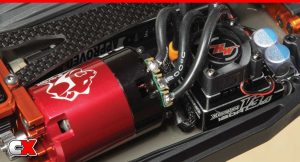 • I found the parts quality on the TM4 to be very good during the build, however I did run into two things I thought I should mention. I had to do a little extra grinding on the rear top deck to gain access to the battery plug. This is not a big deal but unfortunately it was something I had to do. The other thing you might want to keep your eye on is the front steering knuckles. After installing the ball ends into them, I noticed some stress lines appearing in the plastic. I didn’t have any issues during my test session (where I did have a few ‘mishaps’), but it’s something to keep an eye on. Team C has stated they’re looking into this.
• I found the parts quality on the TM4 to be very good during the build, however I did run into two things I thought I should mention. I had to do a little extra grinding on the rear top deck to gain access to the battery plug. This is not a big deal but unfortunately it was something I had to do. The other thing you might want to keep your eye on is the front steering knuckles. After installing the ball ends into them, I noticed some stress lines appearing in the plastic. I didn’t have any issues during my test session (where I did have a few ‘mishaps’), but it’s something to keep an eye on. Team C has stated they’re looking into this.
PROS
+ Flat, 7075-T6 hard anodized chassis with plastic side rails
+ Mid-motor design helps with weight distribution
+ Servo is easily accessible
+ Center slipper clutch
+ Very smooth shocks
+ Nice, thick carbon fiber shock towers
+ Parts quality is excellent
+ Body sits low, but also nice and tight to the chassis
+ Great steering
+ Great in-air manners
CONS
– Parts support may be an issue
– Had to modify the top deck slightly to get to the battery plugs
– Front droop screws impossible to get to
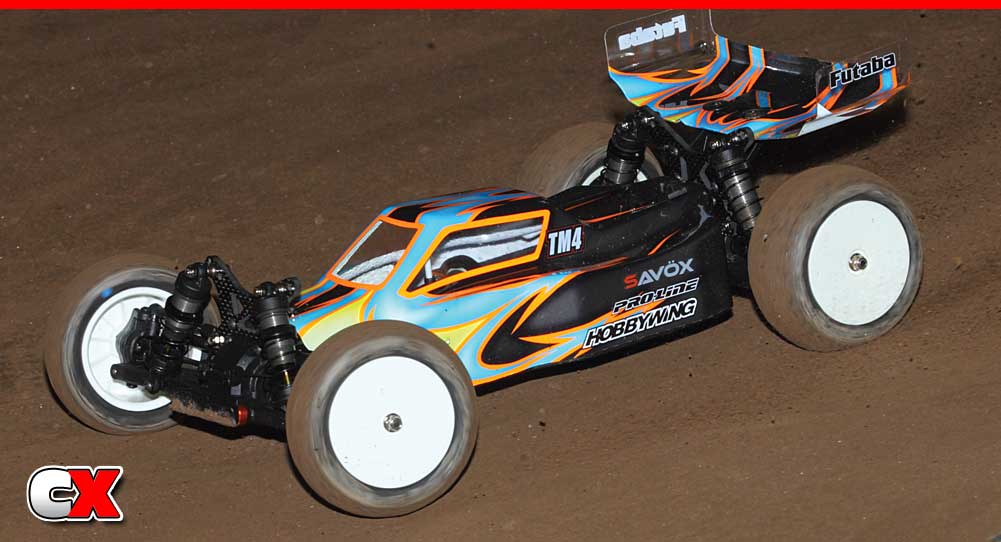
ON THE TRACK
Because it’s winter here, I’m always happy when Walter says we’re going to Wolcott Hobbies for a photo shoot; that means WARMTH! Plus, the track is prepped and consistent, a good combo when you’re doing a little testing with a new car.
STEERING
The Team C TM4 has excellent steering, much more than I was expecting. It’s snappy as well, and changes directions very quickly. On certain corners (mostly off-camber or downhill), there was a slight push coming out and you had to wait for it before getting back in the throttle, but entry and flat-corners steering were both excellent.
ACCELERATION/BRAKING
The first lap on the track had the TM4 hissing like a pissed off cobra. The traction on the track was pretty high and the factory slipper setting just wasn’t cutting it. A quick trip to the pit table and I had removed the slipper retaining setscrew, tightened the slipper about two turns and reinstalled the setscrew … 15 seconds … done! I threw the TM4 back out on the track and there was a night-and-day difference in the acceleration. I actually had to use throttle control on the short chutes and through the center jumps or I would completely blow the following corners. The Hobbywing ESC had a really good feel to it, responding well to light inputs, but was utterly explosive when I hit the straight. You could hear the high-pitched whine of the tires breaking lose as I dumped all the power through the 6.5T motor! The brakes felt good as well with very little fade, however, to be honest, I really only used them on two corners of the track; the rest of the time I was pitching the TM4 around like it was Ken Block’s Fiesta.
HANDLING
The track surface was pretty flat with only a few chances to catch some air, so I didn’t get a chance to put the TM4 through any major rough-track testing. As I mentioned before, the overall feel of the steering was really good with only a hint of push in off-camber or downhill turns. I had to adjust my line (and entry speed) a bit but it was nothing serious. A tiny bit of tuning could fix that. Where the TM4 seems to really shine is high-speed sweepers and in the air. The Wolcott layout featured a high-speed sweeper going onto the straight; while I could easily overpower the tires and get the car loose, it was never out of control. Throttle management put the TM4 into a nice, controllable power drift that was very predictable. At the other end of the straight was another full, high-speed sweeper. Lift a bit before entry to settle the car and it would hug the pipe like it was attached to it. Now I’m not saying it would do it every lap and sure, you could mess it up (I did a few times), but it was the car’s ability to grip that had me pushing the limits each lap. As far as jumping, the TM4 is very comfortable in the air. It jumps very level and is easily affected by throttle inputs, so be careful once you get it off the ground. Only light adjustments are needed for that perfect flat-attitude. It’s also very happy on landings, plopping on the ground like a sack of potatoes and not bucking back up. For my test session, the TM4’s suspension was set up pretty close to where it needed to be. Pretty close is good, but I will be fiddling with some settings to get it near perfect.
DURABILITY
Thankfully I didn’t have to do much durability testing, but that’s not to say I didn’t try. On the first couple opening laps while trying to get a feel for the sweeper at the end of the straightaway, I clipped, nudged and completely stuck the nose of the TM4 into the pipe a few times. While the sounds were something out of a ‘best-of’ crash compilation, I’m happy to say that nothing broke or bent in the day’s test session. As I mentioned before, I was a little worried about the front knuckles and the stress marks that formed during assembly, but after closer inspection everything looked fine.
SPECS & TUNING OPTIONS
DIMENSIONS
LENGTH: 15.75 in. (400mm)
WIDTH: 9.06 in. (230mm)
HEIGHT: 5.51 in. (140mm)
WHEELBASE: 11.42 in. (290mm)
BODY, WHEELS AND TIRES
BODY: Clear cab-forward body
WHEELS: White dish
WHEEL ADAPTER TYPE: 14mm hex
TIRES: Not included
SUSPENSION
TYPE: 4-wheel independent
SHOCK POSITIONS: (F) 3-tower, 2-arm, (R) 3-tower, 2-arm
CAMBER: Adjustable turnbuckles
ROLL: Optional locations in shock tower
WHEELBASE: Adjustable with shims
RIDE HEIGHT: Threaded shocks
STEERING
TYPE: Dual bellcrank
TOE: Turnbuckles
CHASSIS
TYPE: Flat plate with side rails
MATERIAL: Hard-anodized 7075-T6 Aluminum
THICKNESS: 2mm
DRIVETRAIN
TYPE: 4WD
TRANSMISSION: N/A
DIFFERENTIAL: Three gear differentials
CLUTCH TYPE: Center slipper
GEAR RATIO: Optional pinion gears
BEARINGS: Full shielded
WRAP UP
The 4WD world is getting quite competitive right now and everyone is looking for that something special to catch your eye. Team C has put the TM4 on the shelf (and the track) in a 4WD’s simplest form and wants you to just put it together and race. But don’t be fooled by its lack of caster inserts, floating servos or extra aluminum bits; the TM4 is quite capable of putting you in the winner’s circle! Just build it and drive; and enjoy the ride.
LINKS
Futaba futaba-rc.com, (217) 398-8970
Hobbywing Distributed by HRP Distributing, hrpdealer.com, (800) 860-3709
Kustom RC Graphics kustomrcgraphics.com, kustomrcgraphics@aol.com
Pro-Line prolineracing.com, (800) 899-7223
Savox Distributed by HRP Distributing, hrpdealer.com, (800) 860-3709
Team C Distributed by HRP Distributing, hrpdealer.com, (800) 860-3709
 CompetitionX CompetitionX is the most up-to-date source for RC Car News, Reviews and Videos for Radio Control. We also have the most comprehensive Manual Database on the web.
CompetitionX CompetitionX is the most up-to-date source for RC Car News, Reviews and Videos for Radio Control. We also have the most comprehensive Manual Database on the web.







